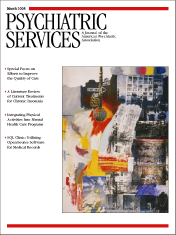Construct Validity of a Measure of Subjective Satisfaction With Life of Adults With Serious Mental Illness
Abstract
OBJECTIVE: In a multisite study, the authors examined the construct validity and utility of a brief self-report Satisfaction With Life scale, an expanded 21-item version of one of the earliest measures of subjective satisfaction with life used with individuals with serious and persistent mental illness. The Satisfaction With Life scale measures satisfaction in four domains: living situation, social relationships, work, and self and present life. METHODS: Satisfaction With Life scale data were gathered from consumers receiving community treatment at two sites in Los Angeles (N=166 and N=172, respectively) and one in Wisconsin (N=146). A confirmatory factor analysis of a hypothesized four-factor structure using data from the pooled Los Angeles samples revealed that several items were less than optimal indicators of the underlying domain. On the basis of an analysis of each item, the Satisfaction With Life scale was reduced to 18 items, and the factor structure and factor loadings of the revised scale were cross-validated with data from the Wisconsin sample. The 18-item scale was further validated by testing hypotheses regarding the relationship between the instrument's four domains, or subscales, and clinically important life conditions of clients in the areas of symptoms, living and employment situations, and social relationships. RESULTS: The findings provided excellent support for the construct validity of the 18-item Satisfaction With Life scale, which assesses an individual's subjective satisfaction with his or her current life in the four domains: living situation, social relationships, work, and self and present life. CONCLUSIONS: The brief, easily completed 18-item Satisfaction With Life scale is a useful tool in evaluation research for assessing the subjective satisfaction with life of adults with serious mental illness.



